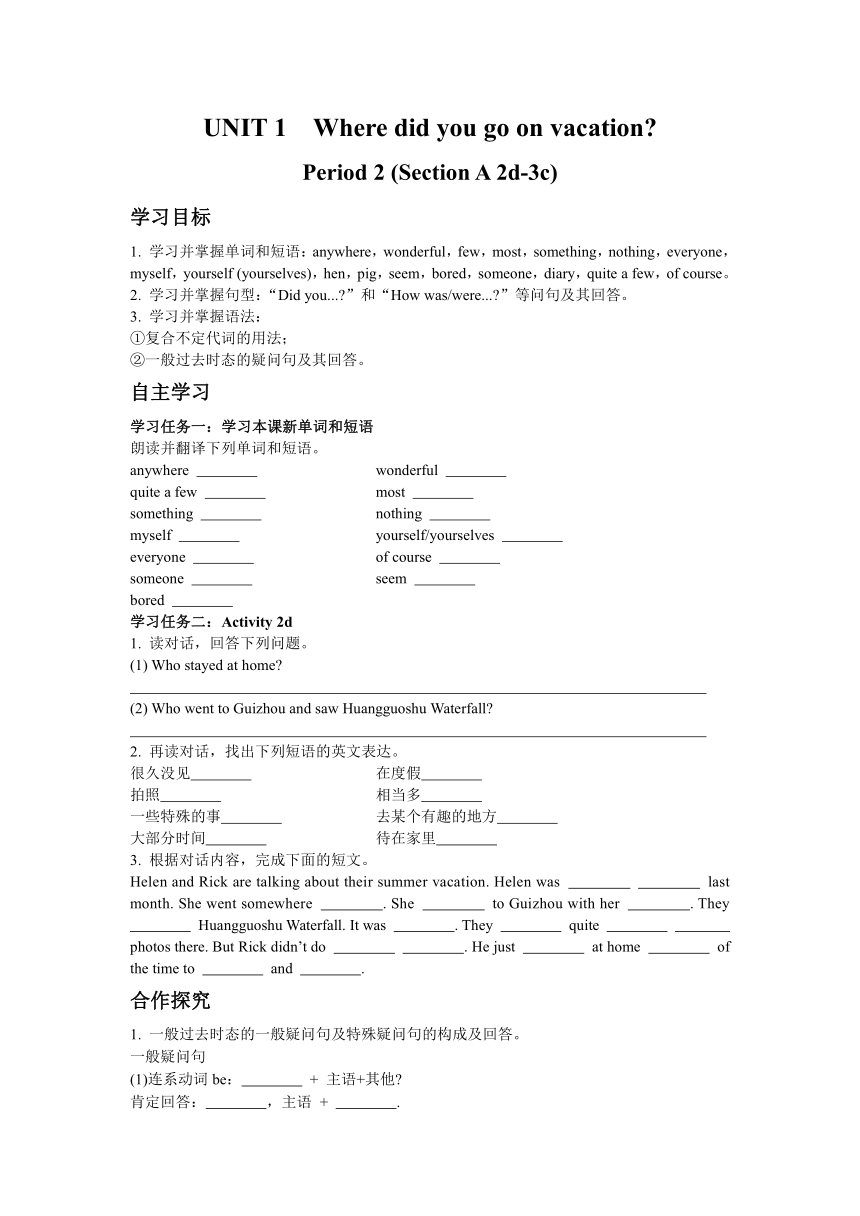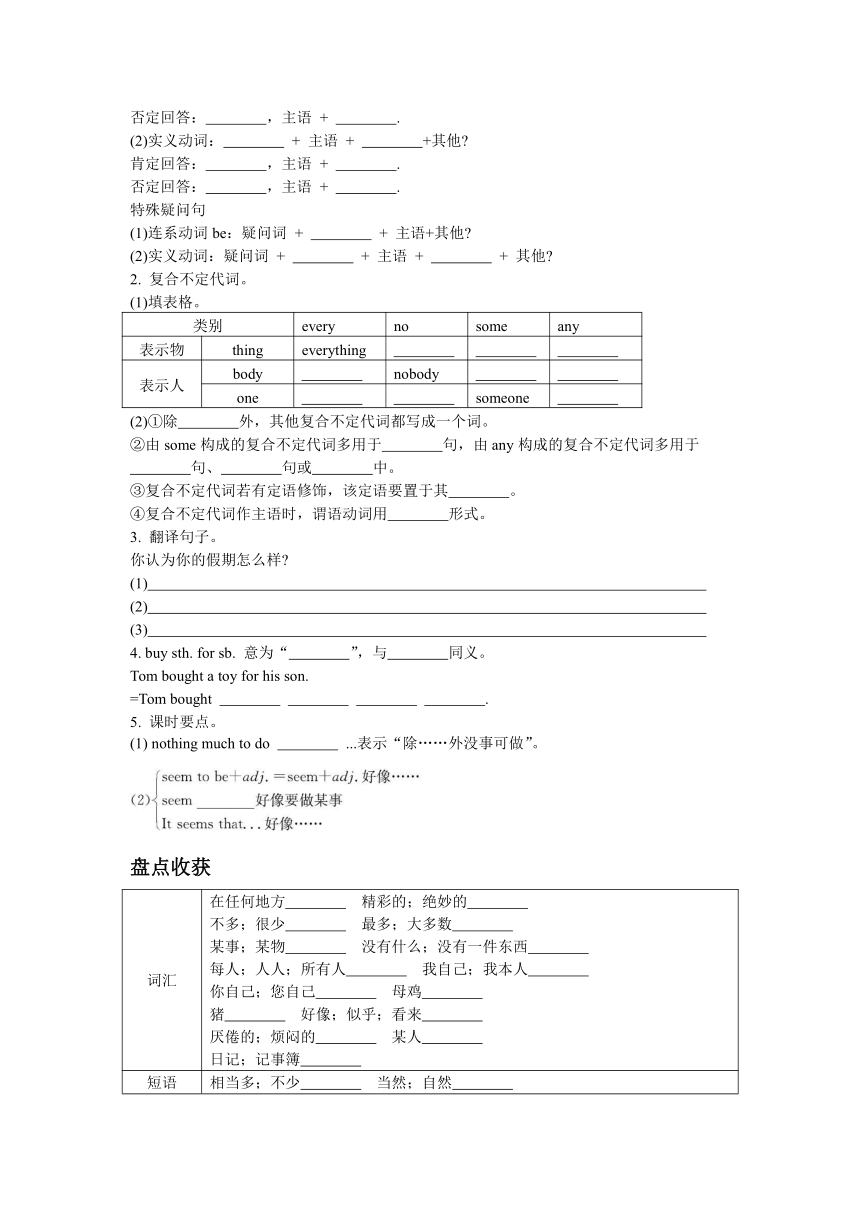Unit 1 Where did you go on vacation Period 2 (Section A 2d-3c)学案(含解析)
文档属性
| 名称 | Unit 1 Where did you go on vacation Period 2 (Section A 2d-3c)学案(含解析) |  | |
| 格式 | docx | ||
| 文件大小 | 37.4KB | ||
| 资源类型 | 教案 | ||
| 版本资源 | 人教新目标(Go for it)版 | ||
| 科目 | 英语 | ||
| 更新时间 | 2023-08-19 15:40:12 | ||
图片预览


文档简介
UNIT 1 Where did you go on vacation
Period 2 (Section A 2d-3c)
学习目标
1. 学习并掌握单词和短语:anywhere,wonderful,few,most,something,nothing,everyone,myself,yourself (yourselves),hen,pig,seem,bored,someone,diary,quite a few,of course。
2. 学习并掌握句型:“Did you... ”和“How was/were... ”等问句及其回答。
3. 学习并掌握语法:
①复合不定代词的用法;
②一般过去时态的疑问句及其回答。
自主学习
学习任务一:学习本课新单词和短语
朗读并翻译下列单词和短语。
anywhere wonderful
quite a few most
something nothing
myself yourself/yourselves
everyone of course
someone seem
bored
学习任务二:Activity 2d
1. 读对话,回答下列问题。
(1) Who stayed at home
(2) Who went to Guizhou and saw Huangguoshu Waterfall
2. 再读对话,找出下列短语的英文表达。
很久没见 在度假
拍照 相当多
一些特殊的事 去某个有趣的地方
大部分时间 待在家里
3. 根据对话内容,完成下面的短文。
Helen and Rick are talking about their summer vacation. Helen was last month. She went somewhere . She to Guizhou with her . They
Huangguoshu Waterfall. It was . They quite
photos there. But Rick didn’t do . He just at home of the time to and .
合作探究
1. 一般过去时态的一般疑问句及特殊疑问句的构成及回答。
一般疑问句
(1)连系动词be: + 主语+其他
肯定回答: ,主语 + .
否定回答: ,主语 + .
(2)实义动词: + 主语 + +其他
肯定回答: ,主语 + .
否定回答: ,主语 + .
特殊疑问句
(1)连系动词be:疑问词 + + 主语+其他
(2)实义动词:疑问词 + + 主语 + + 其他
2. 复合不定代词。
(1)填表格。
类别 every no some any
表示物 thing everything
表示人 body nobody
one someone
(2)①除 外,其他复合不定代词都写成一个词。
②由some构成的复合不定代词多用于 句,由any构成的复合不定代词多用于
句、 句或 中。
③复合不定代词若有定语修饰,该定语要置于其 。
④复合不定代词作主语时,谓语动词用 形式。
3. 翻译句子。
你认为你的假期怎么样
(1)
(2)
(3)
4. buy sth. for sb. 意为“ ”,与 同义。
Tom bought a toy for his son.
=Tom bought .
5. 课时要点。
(1) nothing much to do ...表示“除……外没事可做”。
盘点收获
词汇 在任何地方 精彩的;绝妙的 不多;很少 最多;大多数 某事;某物 没有什么;没有一件东西 每人;人人;所有人 我自己;我本人 你自己;您自己 母鸡 猪 好像;似乎;看来 厌倦的;烦闷的 某人 日记;记事簿
短语 相当多;不少 当然;自然
续表
句型 好久不见。 你去了某个有趣的地方吗 食物怎么样 你认为你的假期怎么样
语法 a. 一般过去时的疑问句及其回答 b. 复合不定代词
语言交际 谈论假日活动
当堂达标
Ⅰ. 用所给单词的适当形式填空
1. —Did you buy anything for (you)
—No,I didn’t.
2. There was nothing (do) there but watch TV.
3. The little boy seems (know) everything.
4. Maria wrote a lot of (diary).
5. Nobody (listen) to you in the office or at home.
6. Everybody (like) playing games.
7. We’re having a (wonder) time.
8. Did you go (swim) last Saturday
9. We (visit) the museum and saw some interesting pictures.
10. There were some hens and (pig) on his farm.
Ⅱ. 单项填空
1. —Did you enjoy your vacation
— . It was terrible.
A. Yes,I did B. No,I didn’t
C. Yes,I was D. No,I wasn’t
2. Can you see in his painting
A. special something B. special anything
C. something special D. anything special
3. My aunt,Sally,fed many on her farm.
A. diaries B. hens
C. flags D. dishes
4. I’m with his class. I can’t stand it.
A. bored;bored B. boring;boring
C. bored;boring D. boring;bored
5. — was your vacation
—It was great!
A. When B. Where C. How D. What
6. Did you go out with
A. someone B. something
C. anyone D. anything
7. The woman in a hat is aunt.
A. Jack and John B. Jack’s and John
C. Jack’s and John’s D. Jack and John’s
8. —Who helped you finish the work
—No one. I finished it by .
A. me B. my C. myself D. mine
Ⅲ. 根据汉语提示完成句子
1. Where did you (去度假)
2. We (去海滩)last Saturday.
3. My brother has (相当多) friends.
4. I spent (大多数时间) staying at home.
5. The teacher asked us to (写日记) in English.
Ⅳ. 补全对话
A:Hello,Grace. Long time no see.
B:Hello,Steve. Yes,I was on vacation last month.
A:Wow. 1
B:It was great.
A: 2
B:I went to Paris (巴黎).
A: 3
B:I went with my best friend,Laura.
A: 4
B:Yes,we visited many museums. And we saw quite a few old things. We were so excited. 5
A:I didn’t go anywhere interesting. Most of the time I played basketball with my brother.
Ⅴ. 句型转换
1. Lucy went to the mountains last weekend. (就画线部分提问)
Lucy last weekend
2. Ted visited his friends yesterday. (改为否定句)
Ted his friends yesterday.
3. I went there with my parents. (就画线部分提问)
you go there
4. My mother bought me a new bike. (改为同义句)
My mother a new bike me.
5. Everyone had a good time. (改为同义句)
Everyone .
学后反思
_______________________________________________________________________________________________________________________________________________________________________________________________________________________________________________________________________________________________________________________________________________________________________________________________________________________________________________________________________________________________________________________________________________________________________________________________________________________________________________________________________________________________________________________________________
当堂达标参考答案与解析:
Ⅰ. 1. yourself 当句子的宾语与主语指同一个人或物时,宾语用主语的反身代词。由答语中的I可知,you此处为单数意义,故填yourself。
2. to do nothing to do but...意为“除……外没有事情可做”,是固定用法。
3. to know seem to do sth. 是固定用法,意为“好像做某事”。
4. diaries diary为可数名词,a lot of后接可数名词复数,diary的复数形式是diaries。
5. listens 不定代词nobody作主语时,谓语动词用第三人称单数形式。本句是一般现在时态的句子,故填listens。
6. likes 7. wonderful 8. swimming 9. visited 10. pigs
Ⅱ. 1. B 问句是以did开头的一般疑问句,故也用did回答,排除C、D两项。由答语中后句句意“太糟糕了”可知此处应作否定回答,故选B。
2. D 形容词修饰不定代词时应放在不定代词之后,故排除A、B两项;anything常用于否定句、疑问句或条件状语从句中,something一般用于肯定句中,故选D。
3. B diary“日记”;hen“母鸡”;flag“旗帜”;dish“盘,碟”。根据句意“我姑姑萨莉在她的农场里养了很多母鸡”可知选B。
4. C 句意:我厌倦了他无聊的课,我不能忍受了。bored“厌倦的,烦闷的”,在句中作表语,主语一般是人;boring“无聊的,乏味的”,在句中可作表语或定语,作表语时,主语一般是事物。
5. C 根据答句“It was great!”可知上句询问假期过得如何,故选C。
6. C
7. D 句中aunt用了单数形式,由此可知,此处名词所有格表示两人共有的,所以只在后面一个名词后加“’s”。
8. C
Ⅲ. 1. go on vacation 2. went to the beach 3. quite a few 4. most of the time 5. keep diaries
Ⅳ. 1. How was your vacation 由答句“It was great.”及上文中提到的“I was on vacation last month.”可知,此处询问“你的假期过得怎么样?”。
2. Where did you go 根据答句“I went to Paris.”并结合Grace说自己去度假了可知,问句表示“你去哪里了?”。
3. Who did you go with 由答句句意“我和我最好的朋友劳拉一起去的”可知,问句表示“你和谁一起去的?”。
4. Did you do anything interesting 由答句中的Yes可知,该问句是一个一般疑问句;又由答句中的we visited many museums和saw quite a few old things可知,问句表示“你们做什么有趣的事了吗?”。
5. Where did you go on vacation /What about you /How about you 由答句中的“I didn’t go anywhere interesting.(我没有去任何有趣的地方)”可推知,问句表示“你假期去了哪里?”。因为上文中已有此问句,是A问B的一个问题,B再问A同一个问题时也可用“What/How about you ”来代替此问句。
Ⅴ. 1. Where did, go 画线部分to the mountains表示地点,对地点提问用where。
2. didn’t visit
3. Who did, with 画线部分my parents是人,对人提问用who。
4. bought, for buy sb. sth. =buy sth. for sb. 意为“给某人买某物”。
5. had fun/enjoyed themselves have a good time=have fun=enjoy oneself,意为“玩得高兴,玩得愉快”。由原句中的had可知应用一般过去时,故所改写的同义句中的谓语动词也应用过去式。
Period 2 (Section A 2d-3c)
学习目标
1. 学习并掌握单词和短语:anywhere,wonderful,few,most,something,nothing,everyone,myself,yourself (yourselves),hen,pig,seem,bored,someone,diary,quite a few,of course。
2. 学习并掌握句型:“Did you... ”和“How was/were... ”等问句及其回答。
3. 学习并掌握语法:
①复合不定代词的用法;
②一般过去时态的疑问句及其回答。
自主学习
学习任务一:学习本课新单词和短语
朗读并翻译下列单词和短语。
anywhere wonderful
quite a few most
something nothing
myself yourself/yourselves
everyone of course
someone seem
bored
学习任务二:Activity 2d
1. 读对话,回答下列问题。
(1) Who stayed at home
(2) Who went to Guizhou and saw Huangguoshu Waterfall
2. 再读对话,找出下列短语的英文表达。
很久没见 在度假
拍照 相当多
一些特殊的事 去某个有趣的地方
大部分时间 待在家里
3. 根据对话内容,完成下面的短文。
Helen and Rick are talking about their summer vacation. Helen was last month. She went somewhere . She to Guizhou with her . They
Huangguoshu Waterfall. It was . They quite
photos there. But Rick didn’t do . He just at home of the time to and .
合作探究
1. 一般过去时态的一般疑问句及特殊疑问句的构成及回答。
一般疑问句
(1)连系动词be: + 主语+其他
肯定回答: ,主语 + .
否定回答: ,主语 + .
(2)实义动词: + 主语 + +其他
肯定回答: ,主语 + .
否定回答: ,主语 + .
特殊疑问句
(1)连系动词be:疑问词 + + 主语+其他
(2)实义动词:疑问词 + + 主语 + + 其他
2. 复合不定代词。
(1)填表格。
类别 every no some any
表示物 thing everything
表示人 body nobody
one someone
(2)①除 外,其他复合不定代词都写成一个词。
②由some构成的复合不定代词多用于 句,由any构成的复合不定代词多用于
句、 句或 中。
③复合不定代词若有定语修饰,该定语要置于其 。
④复合不定代词作主语时,谓语动词用 形式。
3. 翻译句子。
你认为你的假期怎么样
(1)
(2)
(3)
4. buy sth. for sb. 意为“ ”,与 同义。
Tom bought a toy for his son.
=Tom bought .
5. 课时要点。
(1) nothing much to do ...表示“除……外没事可做”。
盘点收获
词汇 在任何地方 精彩的;绝妙的 不多;很少 最多;大多数 某事;某物 没有什么;没有一件东西 每人;人人;所有人 我自己;我本人 你自己;您自己 母鸡 猪 好像;似乎;看来 厌倦的;烦闷的 某人 日记;记事簿
短语 相当多;不少 当然;自然
续表
句型 好久不见。 你去了某个有趣的地方吗 食物怎么样 你认为你的假期怎么样
语法 a. 一般过去时的疑问句及其回答 b. 复合不定代词
语言交际 谈论假日活动
当堂达标
Ⅰ. 用所给单词的适当形式填空
1. —Did you buy anything for (you)
—No,I didn’t.
2. There was nothing (do) there but watch TV.
3. The little boy seems (know) everything.
4. Maria wrote a lot of (diary).
5. Nobody (listen) to you in the office or at home.
6. Everybody (like) playing games.
7. We’re having a (wonder) time.
8. Did you go (swim) last Saturday
9. We (visit) the museum and saw some interesting pictures.
10. There were some hens and (pig) on his farm.
Ⅱ. 单项填空
1. —Did you enjoy your vacation
— . It was terrible.
A. Yes,I did B. No,I didn’t
C. Yes,I was D. No,I wasn’t
2. Can you see in his painting
A. special something B. special anything
C. something special D. anything special
3. My aunt,Sally,fed many on her farm.
A. diaries B. hens
C. flags D. dishes
4. I’m with his class. I can’t stand it.
A. bored;bored B. boring;boring
C. bored;boring D. boring;bored
5. — was your vacation
—It was great!
A. When B. Where C. How D. What
6. Did you go out with
A. someone B. something
C. anyone D. anything
7. The woman in a hat is aunt.
A. Jack and John B. Jack’s and John
C. Jack’s and John’s D. Jack and John’s
8. —Who helped you finish the work
—No one. I finished it by .
A. me B. my C. myself D. mine
Ⅲ. 根据汉语提示完成句子
1. Where did you (去度假)
2. We (去海滩)last Saturday.
3. My brother has (相当多) friends.
4. I spent (大多数时间) staying at home.
5. The teacher asked us to (写日记) in English.
Ⅳ. 补全对话
A:Hello,Grace. Long time no see.
B:Hello,Steve. Yes,I was on vacation last month.
A:Wow. 1
B:It was great.
A: 2
B:I went to Paris (巴黎).
A: 3
B:I went with my best friend,Laura.
A: 4
B:Yes,we visited many museums. And we saw quite a few old things. We were so excited. 5
A:I didn’t go anywhere interesting. Most of the time I played basketball with my brother.
Ⅴ. 句型转换
1. Lucy went to the mountains last weekend. (就画线部分提问)
Lucy last weekend
2. Ted visited his friends yesterday. (改为否定句)
Ted his friends yesterday.
3. I went there with my parents. (就画线部分提问)
you go there
4. My mother bought me a new bike. (改为同义句)
My mother a new bike me.
5. Everyone had a good time. (改为同义句)
Everyone .
学后反思
_______________________________________________________________________________________________________________________________________________________________________________________________________________________________________________________________________________________________________________________________________________________________________________________________________________________________________________________________________________________________________________________________________________________________________________________________________________________________________________________________________________________________________________________________________
当堂达标参考答案与解析:
Ⅰ. 1. yourself 当句子的宾语与主语指同一个人或物时,宾语用主语的反身代词。由答语中的I可知,you此处为单数意义,故填yourself。
2. to do nothing to do but...意为“除……外没有事情可做”,是固定用法。
3. to know seem to do sth. 是固定用法,意为“好像做某事”。
4. diaries diary为可数名词,a lot of后接可数名词复数,diary的复数形式是diaries。
5. listens 不定代词nobody作主语时,谓语动词用第三人称单数形式。本句是一般现在时态的句子,故填listens。
6. likes 7. wonderful 8. swimming 9. visited 10. pigs
Ⅱ. 1. B 问句是以did开头的一般疑问句,故也用did回答,排除C、D两项。由答语中后句句意“太糟糕了”可知此处应作否定回答,故选B。
2. D 形容词修饰不定代词时应放在不定代词之后,故排除A、B两项;anything常用于否定句、疑问句或条件状语从句中,something一般用于肯定句中,故选D。
3. B diary“日记”;hen“母鸡”;flag“旗帜”;dish“盘,碟”。根据句意“我姑姑萨莉在她的农场里养了很多母鸡”可知选B。
4. C 句意:我厌倦了他无聊的课,我不能忍受了。bored“厌倦的,烦闷的”,在句中作表语,主语一般是人;boring“无聊的,乏味的”,在句中可作表语或定语,作表语时,主语一般是事物。
5. C 根据答句“It was great!”可知上句询问假期过得如何,故选C。
6. C
7. D 句中aunt用了单数形式,由此可知,此处名词所有格表示两人共有的,所以只在后面一个名词后加“’s”。
8. C
Ⅲ. 1. go on vacation 2. went to the beach 3. quite a few 4. most of the time 5. keep diaries
Ⅳ. 1. How was your vacation 由答句“It was great.”及上文中提到的“I was on vacation last month.”可知,此处询问“你的假期过得怎么样?”。
2. Where did you go 根据答句“I went to Paris.”并结合Grace说自己去度假了可知,问句表示“你去哪里了?”。
3. Who did you go with 由答句句意“我和我最好的朋友劳拉一起去的”可知,问句表示“你和谁一起去的?”。
4. Did you do anything interesting 由答句中的Yes可知,该问句是一个一般疑问句;又由答句中的we visited many museums和saw quite a few old things可知,问句表示“你们做什么有趣的事了吗?”。
5. Where did you go on vacation /What about you /How about you 由答句中的“I didn’t go anywhere interesting.(我没有去任何有趣的地方)”可推知,问句表示“你假期去了哪里?”。因为上文中已有此问句,是A问B的一个问题,B再问A同一个问题时也可用“What/How about you ”来代替此问句。
Ⅴ. 1. Where did, go 画线部分to the mountains表示地点,对地点提问用where。
2. didn’t visit
3. Who did, with 画线部分my parents是人,对人提问用who。
4. bought, for buy sb. sth. =buy sth. for sb. 意为“给某人买某物”。
5. had fun/enjoyed themselves have a good time=have fun=enjoy oneself,意为“玩得高兴,玩得愉快”。由原句中的had可知应用一般过去时,故所改写的同义句中的谓语动词也应用过去式。
同课章节目录
- Unit 1 Where did you go on vacation?
- Section A
- Section B
- Unit 2 How often do you exercise?
- Section A
- Section B
- Unit 3 I'm more outgoing than my sister.
- Section A
- Section B
- Unit 4 What's the best movie theater?
- Section A
- Section B
- Unit 5 Do you want to watch a game show?
- Section A
- Section B
- Unit 6 I'm going to study computer science.
- Section A
- Section B
- Unit 7 Will people have robots?
- Section A
- Section B
- Unit 8 How do you make a banana milk shake?
- Section A
- Section B
- Unit 9 Can you come to my party?
- Section A
- Section B
- Unit 10 If you go to the party, you'll have a grea
- Section A
- Section B
